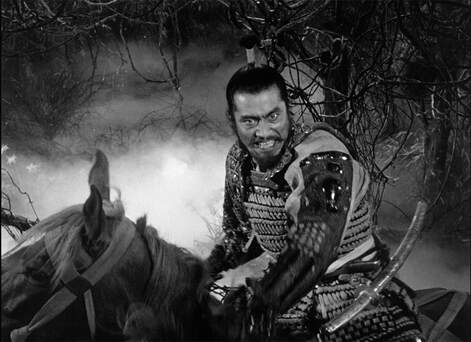B | A Japanese samurai general receives a prophecy about his future success. Directed by Akira Kurosawa Starring Toshiro Mifune and Isuzu Yamada Review by Jon Kissel |

The opening credits for Throne of Blood are set against a desolate landscape, accompanied by a funereal dirge. It’s suggested that this environment arises after the events of the film, and based on its tone of resigned violence, a wasteland is the likely end result. Washizu is a puppet operated by his wife, and they both are buffeted along evil currents by a flimsy prophecy. Kurosawa never tips his hand to just how powerful the mystic was. He could have heard of a great victory before the two generals arrived at his lair, and made a lucky guess as to their rewards. After that initial ‘accuracy,’ it no longer matters for someone as superstitious as Washizu and his wife. Their paranoia forces the prophecy to come true, even in the face of the lord’s magnanimity.
The mystic himself is found in the woods singing about the transience and insignificance of humanity, a tune Washizu should’ve listened to more closely. This mirrors the environmental collapse in the opening credits. The only sure fortune is that all will eventually return to the earth. It is Washizu’s folly to think that he can write his own future on the backs of his one-time friends. Humility, in the face of his comrades and the universe, is something he is incapable of, and he pays the price for it. He laments that his time is a time when brother must kill brother, but that is only true because of men like him. He hastens the destruction of his world by trying to grab his destiny and shake it into submission, when instead he should have submitted to his good fortune in receiving the castle in the first place. He and his wife dig their own graves.
The acting here is big and operatic. Statements are near-yelled, and feelings are hugely felt. This was very noticeable but not a deal-breaker. Toshiro Mfune is strong throughout as Washizu, twisting and contorting his face as he gives in to madness. Asaji, conversely, is always in control, rarely speaking above a whisper as she poisons her husband’s mind. The sets and costumes are all convincing and impressive, from the wooden castles to the elaborate armor of feudal samurai. Kurosawa adds in endearing details, like the swish of Asaji’s kimono as she glides through her home. The film’s greatest feat has to be Washizu’s ultimate fate, impaled on a wave of arrows that were shot by real archers, providing a level of terror in Mifune’s performance above what the great actor can bring to the table.
For source material, a filmmaker can’t go wrong with Shakespeare, though Macbeth is such a famous tale that it’s fairly difficult to be ignorant of its broad strokes. Everything here was predictable but only because it couldn’t have gone any other way by the story. Once Washizu’s confirmation bias sets in, that’s all she wrote for him. This was the first Kurosawa film I saw, and while it’s not the best, Throne of Blood provides an example of the tone and precision that he brings to all his movies. B+
 RSS Feed
RSS Feed